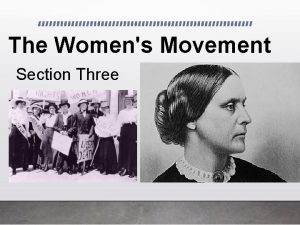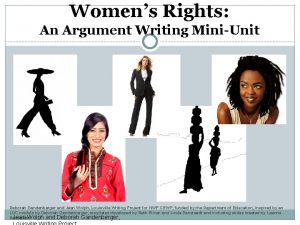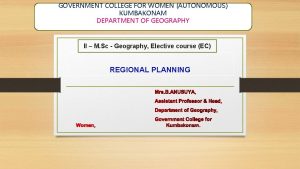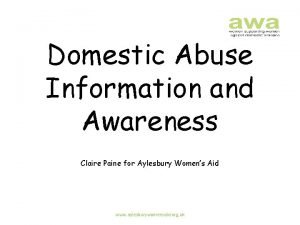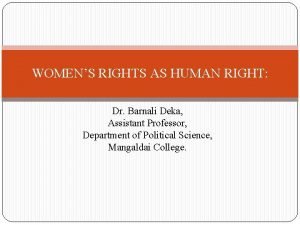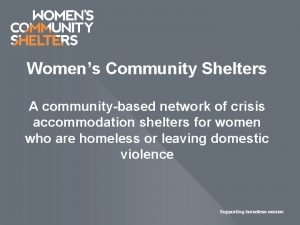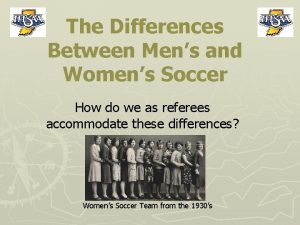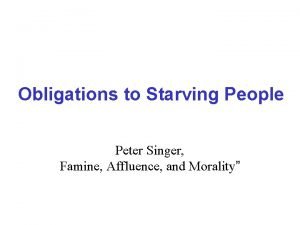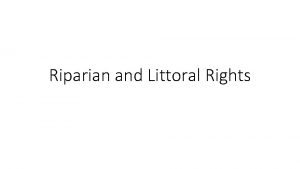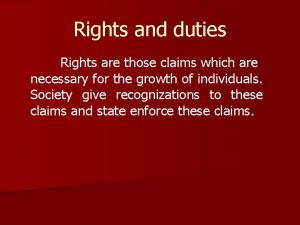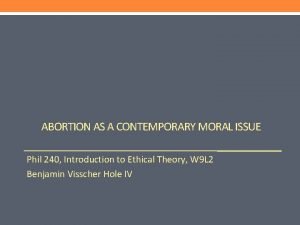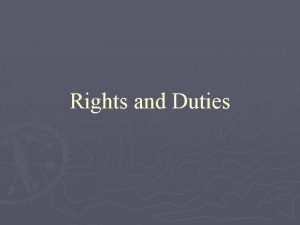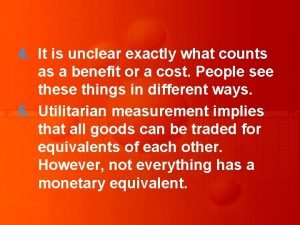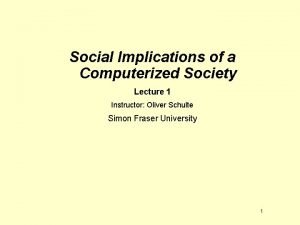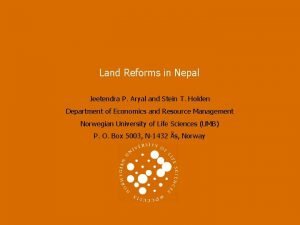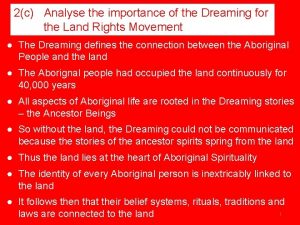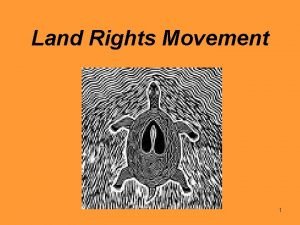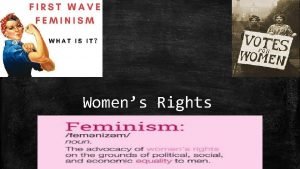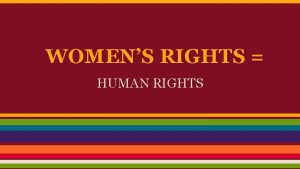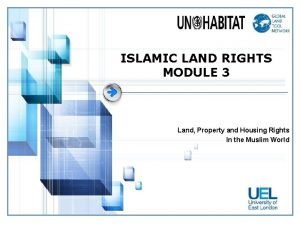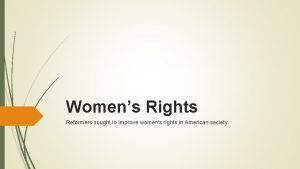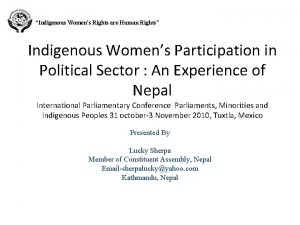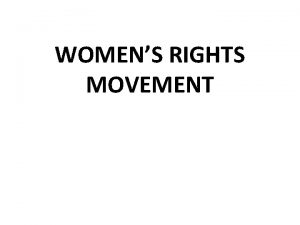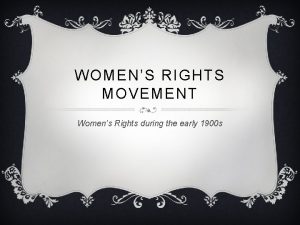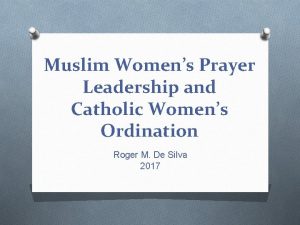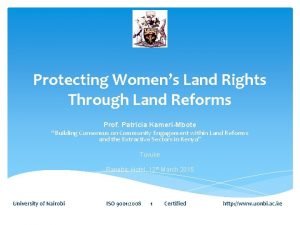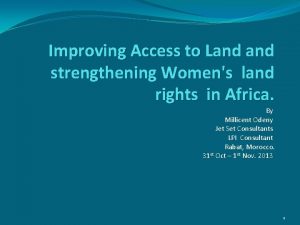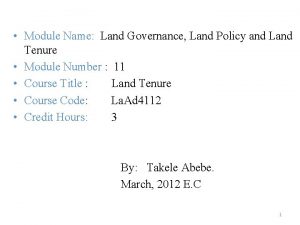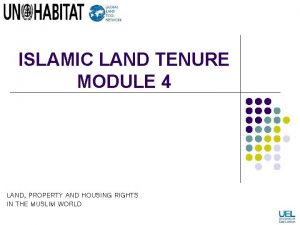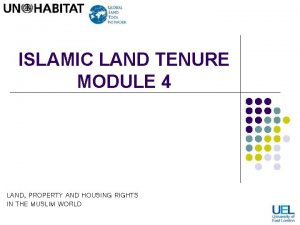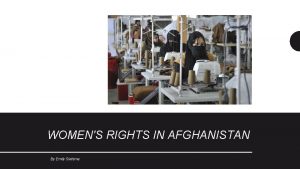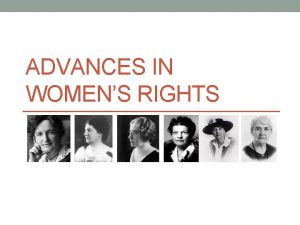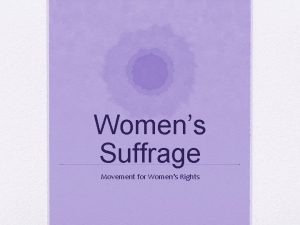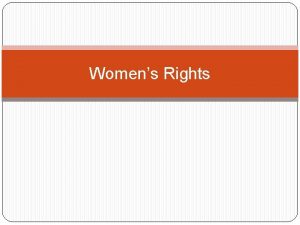MUSLIM WOMENS PROPERTY RIGHTS MODULE 6 LAND PROPERTY

































- Slides: 33

MUSLIM WOMEN’S PROPERTY RIGHTS MODULE 6 LAND, PROPERTY AND HOUSING RIGHTS IN THE MUSLIM WORLD

SESSION LEARNING OUTCOMES At the end of this session, participants should be able to: n Critically assess the stereotypes regarding Muslim women and property n Appreciate the property rights of women under Islamic Law n Examine women’s property rights in relation to custom and family n Evaluate the impact of modern legal reforms n Suggest strategies for empowerment through gender rights

YOUR OPENING THOUGHTS n What experience do you have of Islamic principles in relation to women’s rights? n Why do you think Islamic principles are relevant in the context of Muslim women? n How can Islamic principles empower women’s land, property and housing rights?

WHAT ARE THE KEY COMCEPTS 1. All key Islamic materials generally support women’s rights to acquire, hold, use adminster and dispose of property including land 2. Muslim woman retains control over her pre-marital property and finances through marriage, and beyond into divorce and widowhood. 3. Muslim women, as do counterparts in other societies, face considerable obstacles on accessing land, property and shelter 4. Muslim women’s lack of rights not merely to their religious context 5. Women can hold title individually and jointly

WHY ARE THESE CONCEPTS RELEVANT? ØThere are no ØUnlike husband’s restrictions on women’s obligations to meet his purchase, gifts, dower family needs, there is no (mahr) or as beneficiary such obligaitons for wife. of an endowment (waqf) ØThere is limited awareness of benefits about ØWomen often joint titling. ØOther than specified encounter male dower (mahr), she has bias in formal lawno financial rights mediums, from against former husband. legislation or judicial redress

HOW CAN THESE CONCEPTS BE USED? n Qur’an can be used to enhance women’s access to land. n Except for inheritance shares, Muslim woman is entitled to equal treatment with male members of the family. n Inheritance rules are part of a wider flexible system, tools such as lifetime gifts enable individuals to compensate. n Deal with oppressive family and social structures undermine women’s property rights. n Activists (including Islamic feminists) are challenging patriarchal Islamic law application.

WHY LAND RIGHTS MATTER TO WOMEN? n Land, property and housing rights are a gendered issue, in Muslim and non-Muslim countries n Despite progress, women’s access to land security of tenure remains very low- 2% ownership n Women disproportionately affected by gender blind/ neutral approaches. n Poverty-alleviation agenda for land rights have largely been ineffective. n Muslim women also face significant obstacles in accessing land rights.

IS CEDAW RELEVANT FOR MUSLIM? n Despite reservations to CEDAW, provides an agenda for national action to end gender discrimination. n Civil society, including community and women-led groups use CEDAW for advocacy, empowerment and change. n Reports by UNIFEM, ESCWA etc. provide information, capacity building as well as strategies for land rights. n Many groups work on the convergence approach, highlighting and condolidating the consensus, while negotiating the divergence.

DO MUSLIM WOMEN HAVE LAND RIGHTS? Muslim women possess independent legal, economic and spiritual rights based on Qur’an Islamic rights to acquire, hold, use, administer and dispose of property including land All key Islamic legal materials generally support women’s land rights Property transfer through purchase, inheritance and marriage and other modes

n No restrictions on the property purchased out of her earnings, or gifts received from matal or her husband’s family n No limits as beneficiary of an endowment (waqf). n In all these respects she is entitled to equal treatment with male members of the family. PROPERTUY RIGHTS LOST BY MARRIAGE? Muslim women retain control over premartial property and finances through marriage, divorce and widowhood PROPERTY RIGHTS LOST BY MARRIAGE? n

ARE MEN ‘GUARDIANS’ OVER WOMEN? PRINCIPLES n As per Qur’an (9: 71) women and men are ‘each other’s guardians and mutual protectors’. n Qur’an 4: 34 used to show male superiority. It says “Men are the protector/maintainers [qawwamuna’ala] of women, because God has given the one more preference/ strength than the other, and because they support them from their means”. FACTS l l Schorlars say conditions must exist, must be shown – preference and support. Basic notion involved is not superiority but one of ‘moral guidance and caring’.

GENDER EQUALITY IN ISLAM? n An increasing number of Muslim women, and men openly talk about gender equality. n Resistance to gender equality due to conservative fear that equality would mean identical rights, thereby undermining family and social dynamics. n Several Muslims more comfortable with gender equity in process, but outcome is equality. n Muslim governments have in past not committed explictly to gender equality on all fronts. n On the ground, women asserting rights, autonomy and freedomwithout undermining Islamic values.

WHY PERCEPTION OF NO RIGHTS? 1. Widespread presumption that Muslim women’s property rights are limited in Islamic law. 2. Woman’s lesser rights in inheritance seen as marker of inferior status of women under Islamic framework. 3. Some Muslim states refuse to recognise international resolutions giving women equal land rights. 4. Reservations are entered to international Conventions with respect to equal rights between the sexes. 5. These seen as illustrations of the Muslim woman’s limited property rights.

WHAT RESTRICTS WOMEN’S RIGHTS? Women in Muslim societies may lack rights in the face of oppressive family and social structures Absence of conviction in pursuing property rights Status not just by religion but by racem ethnicity, class, literacy, age, marital status, and other classificaitons such as ‘fairness’, beauty, rural/urban background, displacement or sexuality. Stereotypes of biological roles, construction as a temporary member of the family (through marriage), interests in consolidation of family properties and kinship relations

IS INHERITANCE VITAL FOR WOMEN? Inheritance rules provide women within the family with specific shares Inheritance support women’s more general rights in Islamic law to gain, retain and manage their own land wealth Despite women’s lesser shares in comparison with men, where women do own land it is frequently inherited land.

IS INHERITANCE DISCRIMINATORY? n Women’s inheritance rights appear discriminatory, but not seen that way by many Muslims n Potential within Islamic framework for women to receive other property rights by way of recompense. n Inheritance rules part of a wider flexibe system for the transmission of property across the generations and within the family. n Tools such as lifetime gifts enable individuals to plan the devolution of their property and post-inheritance adjustment practice.

IS ESTATE PALNNING ACCEPTABLE? § Estate planning techniques are subject to debate within Muslim societies, some tensions surrounding their deployment § But commonly used in modern Muslim communities, sometimes to support Islamic ethical principles Most obvious tool of estate planning is the lifetime gift or transfer Waqf can also be used since no gender control

DOES EATATE PLANING BENEFIT WOMEN? n Estate planning may operate both to the benefit and detriment of women. n Lifetime gifts are often used to transfer property, particularly agricultural land, to chosen child. n Daughters may or may not be compensated for their consequent losses. n Common socially accepted practice where women are ‘compensated’ for lesser inheritance.

DO WOMEN RENOUNCE SHARES? Ø Islamic inheritance process do not conceive of rejection of share Ø There is a widespread practice, whereby a person, typically a woman, voluntarily renounces (tanazul) her inheritance rights. Ø Customary practice, now incorporated into the legal process under Islamic law Ø Women may give up an inheritance right to land in ‘exchange’ for cash or other property- or nothing.

WHAT ARGUMENTS OVER RENUNCIATION? A socio-cultural practice, cannot undermine Islamic rights Women forced to renounce their limited inheritance rights, is a concern for gender rights advocates The picture ‘ on the ground’ may be complex The ‘benefits’ of renunciation may include a continuing right of access to a family home.

HOW CAN WOMEN BE COMPENSATED? Lesser inheritance shares, but rules are part of wider flexible system Access to property and land will come at various stages of life WOMEN Compensatory framework of gifts, maintainance, payment of dowers (mahr), and as a beneficiary under an endowment (waqf) No integrated life course persperctive and intergenerational approached used in implementing Islamic law

IS HUSBAND OBLIGED TO MAINTAIN WIFE? n A woman’s fundamental daily requirements will be met by her husband. n No equivalent obligation from the wife towards the husband, even if working. n Savings, used for purchase of property. n Technically, wife may lose maintainance, which is controversially justified by her lack of obedience to the husband (mushuq).

IS MAHR DIFFERENT FROM DOWERY? - immediate or deferred payment - wife’s entitlement under Islamic law - may consist of land or land use rights, as well as other property - Quite distinct from the social phenomenon of dowry payments from the bride’s side to the groom’s side

IS MAHR IMPORTANT FOR WOMEN? n Important part of women’s wealth, including land n Declined in importance as a social institution n Women may relinquish all part of the payment or discharge a husband from his obligation. n Significant in the event of a diovorce, for any deferred dower (mahr) must be paid in full where the husband repudiates his wife (talaq). n If a wife seeks a judical divorce (khula), she is likely to lose any dower payment.

WHAT WILL DIVORCED WOMEN GET? Apart from specified dower (mahr), a wife may have no financial rights against her former 1 husband, even in a case of repudiation (talaq). 2 Husbands may be enjoyed to provide compensation, such as in Egypt and Jordan, where husband has divorced his wife without good reason 3 Such compensatory payments are not generous, amounting at best to a few years’ maintenance

WHAT ROLE DO GIFTS PLAY? n A woman can expect gifts of cash, jewellery or clothing from men throughout her life, including husband, father or brother. n System of ‘compensation’ dependent upon dynamics of custom, family, kinship and interpretations of Islamic law. n Evidence from Yemen and Morocco that some women ‘compensated’ for their losses in gaining access to land, by periodic gifts of money or other personal property. n Such support may not fully compensate for exclusion from rights in land.

DO WOMEN BENEFIT FROM WAQF? Through an endowment (waqf), an owner permanently settles property, including land, its usfrust or income, for use of beneficiaries for specific purposes. Beneficiaries may be family members (waqf ahli) – no restriction on women’s shares; or devoted to general welfare In the past women actively engaged in creating and managing endowments; and benefits under endowments an important source of wealth Family endowment (waqf ahli) abolished in many Muslim countries, but waqf idea is being revived

DOES COMPENSATION WORK? n Compensatory framework holistic, but in practice, fails to deliver equitable access to land. n No mechanism to ensure that woman is compensated for her lesser inheritance share in other ways. n Choices are made on the basis of current demands or needs, rather than a ‘life course’ perspective. n Inheritance shares often land rights, while dower (mahr), endowments (awqaf) are limited to use rights. n Property tends to flow away from women, not towards them. n Customary norms through kinship and family structures seem to trump Islamic principles.

DO COURTS ENFORCE WOMEN’S RIGTHS? Ø Traditionally enforced through Islamic courts. Ø Women in general have restricted access formal lawgenerating mediums. Ø Where opportunity, Muslim women access legal system, whether customary, Islamic (Shir’a) or state courts. Ø Family courts are being promoted in several Muslim countries, which are designed to be less legalistic and to encourage a mediation approach.

LAND REFORM HELPED WOMEN’S RIGHTS? Land reforms in Middle East in 20 th Century bypassed most women Shift from sharecropping to mechanized forms of production consolidated land in hands of men In Egypt, main beneficiaries were rural middle class men and the small number of women who gained access to land did so as guardians of young sons.

WAS FAMILY LAW REFORM GOOD? Ø Condification of personal status law across Muslim societies, from Morocco to Indonesia, cannot be generalised. Ø Algerian Family Code of 1984 is largely faithful to the Shari’a reinforces traditional bonds of kinship. Ø Tunisian Personal Status Code more radical, eg. wife to contribute to family’s maintenance where possible. Ø 2004 Moroccan Mouduwanna groundbreaking. Ø Some reforms create new institution and practices create new freedoms, while other reinforce old discrimination.

HOW TO MEASURE PROGRESS? Rights for Muslim women varies from country to country, and even within specific countries Depends on a variety of factors including race, class, age, disability, displacement etc UNIFEM 2008 surveys progress based on MDGs to achieve gender equality and female empowerment The CEDAW committee periofically reviews country reports in women’s rights ESCWA and others document practice Grassroot, women-led NGOs closely monitor and advocate grater women’s rights

THANK YOU
 Womens rights
Womens rights Womens rights
Womens rights Womens shelter edmonton
Womens shelter edmonton Late night womens hour
Late night womens hour Scarborough womens centre
Scarborough womens centre Ballybeen womens centre
Ballybeen womens centre Womens college kumbakonam
Womens college kumbakonam Picture of female uterus
Picture of female uterus Claire paine
Claire paine Womens lacrosse helmets
Womens lacrosse helmets Womens college kumbakonam
Womens college kumbakonam Womens history month door
Womens history month door Womens right
Womens right Bristol womens voice
Bristol womens voice Womens right
Womens right Needs of adolescence
Needs of adolescence Womens community shelters
Womens community shelters Difference between mens and womens soccer
Difference between mens and womens soccer Positive vs negative rights
Positive vs negative rights Riparian and littoral rights
Riparian and littoral rights Negative rights vs positive rights
Negative rights vs positive rights Characteristics of rights
Characteristics of rights Positive vs negative rights
Positive vs negative rights Legal rights and moral rights
Legal rights and moral rights Positive rights and negative rights
Positive rights and negative rights Positive rights and negative rights
Positive rights and negative rights Land ownership rights
Land ownership rights Irrevocable rights to some limited use of another's land
Irrevocable rights to some limited use of another's land Importance of dreaming for land rights movement
Importance of dreaming for land rights movement Importance of the dreaming for the land rights movement
Importance of the dreaming for the land rights movement What are landforms
What are landforms Grassland landforms
Grassland landforms C device module module 1
C device module module 1 Intellectual property rights
Intellectual property rights
